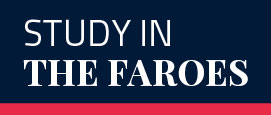- Home
- Left Sidebar
Structure and content
Structure
The Master’s Programme is first and foremost built in conjunction with the other partner universities’ similar Master’s Programmes and courses. Students from the University of the Faroe Islands will have a range of opportunities to combine courses from the five universities and thus build very specific and unique profiles. The first, second, and third semester all offer opportunities to study abroad. The fourth semester offers students the opportunity to apply knowledge and competencies learned so far in a more focused and independent research project.
First semester
Students will take an introductory course at University of Akureyri, Iceland, equal to 10 ECTS points. For the rest of the first semester, equal to 20 ECTS points, students can either take courses at the University of the Faroe Islands or students can take courses at a partner university. Information about studying abroad, deadlines, and application procedures is available on the joint website (www.westnordicstudies.net).
Second semester
The second semester is usually spent abroad at a partner university where a number of courses are offered within the programme. Information about studying abroad, deadlines, and application procedures is available on the joint website (www.westnordicstudies.net). Students may also stay in the Faroe Islands.
Third semester
The third semester is usually spent at the University of the Faroe Islands. Students may also study at a partner university. Information about studying abroad, deadlines, and application procedures is available on the joint website (www.westnordicstudies.net).
Fourth semester
The fourth semester is spent at the University of the Faroe Islands writing the Master’s thesis as well as participating in a mandatory thesis seminar. The thesis and seminar combined equal 30 ECTS points.
Content
The content of the programme at the University of the Faroe Islands is made up of 1) core courses, 2) elective courses (at home or abroad), 3) project work, 4) practice learning work placement, and 5) the Master’s thesis. Each course, the project work, and practice learning work placement will have their own course descriptions available on the university webpage. Course descriptions will describe title, aim, content, learning and teaching approaches, assessment method, learning outcomes, prerequisites, bibliography, examination (e.g. internal or external), marking scale, and level (e.g. master or bachelor).
More information and further details can be found in the Curriculum.
